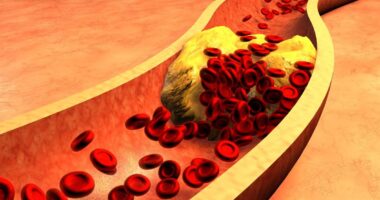Tens of thousands of patients with a debilitating and incurable lung condition could soon benefit from a breakthrough drug which slashes painful symptoms and the risk of dangerous infections.
More than 200,000 people in the UK have bronchiectasis, where the airways of the lungs widen, leading to a build-up of mucus.
Patients often experience a persistent cough, shortness of breath and are vulnerable to life-threatening bugs.

More than 200,000 people in the UK have bronchiectasis, where the airways of the lungs widen, leading to a build-up of mucus
The lung damage is permanent and there are currently no approved NHS treatments.
But a game-changing study, published last week, has found that a daily pill can significantly limit the damage caused by bronchiectasis. Called brensocatib, the tablet blocks cells which trigger inflammation in the lungs.
Trial participants taking the tablet saw a 20 per cent reduction in coughing symptoms and their risk of chest infections fell by 25 per cent. Experts hailed the trial as a turning point for NHS bronchiectasis care, and predicted it could be available on the Health Service within two years.
Bronchiectasis can be triggered by several conditions, including pneumonia or whooping cough.
It can also occur as a result of an allergic reaction to a certain type of fungus called aspergillus.
It is also a common complication of cystic fibrosis – a genetic condition which causes sticky mucus to build up in the lungs.
However, all bronchiectasis patients will experience mucus build-ups.
This is dangerous because bugs can easily populate mucus, raising the risk of a lung infection. Around 1,500 people die due to bronchiectasis in the UK every year.
It is most common in those in their 80s, and women are more likely to be affected than men. NHS patients may be given exercises and special devices to clear the mucus from the lungs.
Doctors may also prescribe antibiotics to clear an infection. However, there is no drug available that can tackle bronchiectasis itself.
In the new international trial, involving 1,600 adults from 35 countries, participants were given two daily brensocatib tablets.
It is known as a DPP1 inhibitor, meaning it blocks the production of damaging inflammatory cells in the lungs, which can widen the airways further. Patients were either given a 10mg tablet, a 25mg tablet, or a sham treatment, known as a placebo. Those who got the 10mg brensocatib saw around a 20 per cent reduction in coughing episodes, and a 25 per cent fall in chest infection.

Bronchiectasis patients often experience a persistent cough, shortness of breath and are vulnerable to life-threatening bugs.
Patients on the 25mg tablet, developed by US pharmaceutical firm Insmed, experienced roughly the same response rate.
The drug was well-tolerated, with the most common side effect being headaches.
‘The treatment appears to be very safe,’ says Professor James Chalmers, a respiratory expert and lead investigator of the trial, from the University of Dundee.
‘The rate of this disease has gone up by 40 per cent in the last ten years, so it is important to find treatments. Chronic obstructive pulmonary disease [COPD] and asthma often overlap with bronchiectasis and are even more common.
‘So it would be interesting to see if these treatments can be used.’










